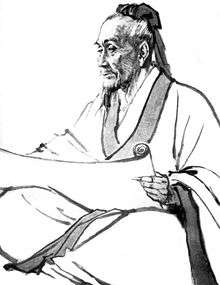Zhang Zhongjing
| Zhang Zhongjing | |
|---|---|
 Zhang Zhongjing | |
| Born | 150 CE (approx.) |
| Died | 219 (aged 68-69) |
| Occupation | Physician |
| Zhang Zhongjing | |||||||||
| Traditional Chinese | 張仲景 | ||||||||
|---|---|---|---|---|---|---|---|---|---|
| Simplified Chinese | 张仲景 | ||||||||
| |||||||||
| Zhang Ji | |||||||
| Traditional Chinese | 張機 | ||||||
|---|---|---|---|---|---|---|---|
| Simplified Chinese | 张机 | ||||||
| |||||||
Zhang Zhongjing (Chinese: 張仲景; 150—219), formal name Zhang Ji (张机), was an Eastern Han dynasty physician and one of the most eminent Chinese physicians during the later years of the Han dynasty. He established medication principles and summed up the medicinal experience until that time, thus making a great contribution to the development of Traditional Chinese Medicine.
Biography
Though well known in modern Chinese medicine and considered one of the finest Chinese physicians in history, very little is known about his life.[1] According to later sources, he was born in Nanyang, held an official position in Changsha and lived from approximately 150 to 219 AD.[2] Exact dates regarding his birth, death and works vary, but an upper limit of 220 AD is generally accepted.[3]
During his time, with warlords fighting for their own territories, many people fell victim to infectious diseases. Zhang's family was no exception. He learned medicine by studying from his towns fellow and later teacher Zhang Bozu, assimilating from previous medicinal literature such as Yellow Emperor's Inner Classic Huangdi Neijing (黄帝内经), and collecting many prescriptions elsewhere, finally writing the medical masterpiece Shanghan Zabing Lun (Chinese: 傷寒雜病論; pinyin: Shānghán Zábìng Lùn, lit. "Treatise on Cold Pathogenic and Miscellaneous Diseases"). Shortly after its publication, the book was lost during the wars that ravaged China during the period of the Three Kingdoms. Because of Zhang's contribution to traditional Chinese medicine, he is often regarded as the sage of Chinese medicine.
Zhang's masterpiece, Shanghan Zabing Lun, was collected and organised later by physicians, notably Wang Shuhe (王叔和) from the Jin Dynasty (晋) and various court physicians during the Song Dynasty (宋) into two books, namely for the former, the Shang Han Lun (傷寒論, lit. "On Cold Damage"), which was mainly on a discourse on how to treat epidemic infectious diseases causing fevers prevalent during his era, and the latter, the Jingui Yaolue (金櫃要略, lit. "Essential Prescriptions of the Golden Coffer"), a compendium of various clinical experiences which was regarded as a main discourse on internal diseases. These two texts have been heavily reconstructed several times up to the modern era.[4] Revered for authoring the Shāng Hán Zá Bìng Lùn, Zhang Zhongjing is considered to have founded the Cold Damage or "Cold Disease" school of Chinese medicine and is widely considered the seminal expert to this day.
See also
References
- ↑ Shāng Hán Lùn: On Cold Damage, Translation & Commentaries. Craig Mitchell, Féng Yè and Nigel Wiseman 1999, p. 2
- ↑ Mitchell et al. 1999, p. 2
- ↑ See Mitchell et al. 1999, pp. 1–2, Early Chinese Texts: A Bibliographical Guide. Michael Loewe (ed.) 1993, p. 197 for discussion.
- ↑ See Mitchell et al. 1999, pp. 1–4.